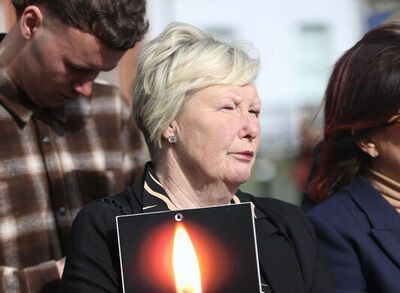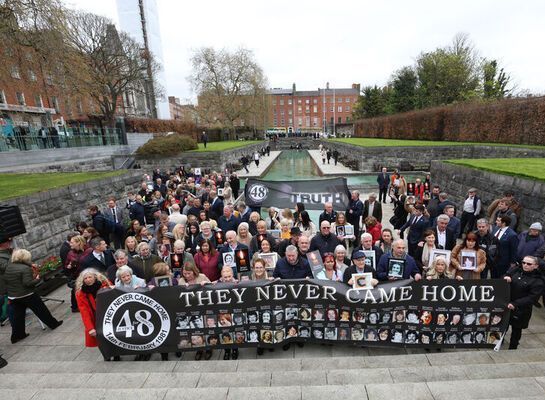By Anthony Neeson
Just as in life, former British prime minister Margaret Thatcher has divided opinion after news of her death.
The Iron Lady died on Monday after suffering a stroke while staying in the Ritz Hotel in London. She was 87.
In power during the years of the 1981 hunger-strike - which made her a hate figure with republicans - she also signed the Anglo-Irish agreement which saw unionist MPs resign their seats at Westminster and campaign against Irish government "interference" in Northern Ireland. Thatcher also survived an IRA murder bid at the Grand Hotel in Brighton in October 1984 during the Conservative Party conference, which killed five people.
While some people thought news of her death deserved a street party, as in Belfast and Derry - as well as parts of Britain - others were hailing her as the woman who saved modern Britain.
Sinn Féin president Gerry Adams wasn't one of those, however. He said her handling of the 1981 hunger-strike prolonged the Troubles.
"Here in Ireland her espousal of old draconian militaristic policies prolonged the war and caused great suffering," Adams said.
"She embraced censorship, collusion and the killing of citizens by covert operations, including the targeting of solicitors like Pat Finucane, alongside more open military operations and refused to recognize the rights of citizens to vote for parties of their choice."
Adams added: "It should be noted that in complete contradiction of her public posturing, she authorized a back channel of communications with the Sinn Féin leadership but failed to act on the logic of this.
"Unfortunately, she was faced with weak Irish governments who failed to oppose her securocrat agenda or to enlist international support in defense of citizens in the North.
"Margaret Thatcher will be especially remembered for her shameful role during the epic hunger strikes of 1980 and '81. Her Irish policy failed miserably."
By contrast, DUP leader and Northern Ireland First Minister, Peter Robinson, called Thatcher "one of the greatest political figures of post-war Britain."
Robinson described Lady Thatcher as "transformative and powerful" and said she had "changed the face of our United Kingdom forever."
"As our first female prime minister, she made history and as 'The Iron Lady' she was at the frontline of winning The Cold War as well as ensuring the freedom of the Falklands Islands.
"Whilst we disagreed over the Anglo-Irish Agreement, Mrs. Thatcher was committed to the union and later described the Anglo-Irish Agreement as one of her greatest regrets."
SDLP leader Alasdair McDonnell said Margaret Thatcher was "a controversial and divisive figure in the political landscape on our shores."
"Her politics and approach left her a hostile figure within nationalism," he said.
"The SDLP disagreed fundamentally with Baroness Thatcher's politics and approach to the North and my colleagues clashed many times with her. However, with significant assistance from America, she helped deliver the Anglo Irish Agreement which set the scene for the Good Friday Agreement and the much improved circumstances we find ourselves in today."
Former SDLP Deputy Leader, Seamus Mallon, said the way that Margaret Thatcher dealt with the 1981 hunger strike affects the politics of Northern Ireland to the present day.
At Stormont, Ulster Unionist Party leader Mike Nesbitt said Thatcher was "a colossus of conviction politics." "Whilst we in the Ulster Unionist Party would not have agreed with her on everything, particularly the Anglo-Irish Agreement, Northern Ireland has reason to be eternally grateful for her stance against terrorism, not least during the hunger strikes when Northern Ireland was on the edge of something catastrophic," he added.
President Michael D. Higgins said Thatcher "will be remembered as one of the most conviction-driven British Prime Ministers."
"The policies of Mrs. Thatcher's government in regard to Northern Ireland gave rise to considerable debate at the time," he said.
"However, her key role in signing the Anglo-Irish Agreement will be recalled as a valuable early contribution to the search for peace and political stability."
Taoiseach Enda Kenny said Thatcher was a "formidable political leader who had a significant impact on British, European and world politics."
He stated: "While her period of office came at a challenging time for British-Irish relations, when the violent conflict in Northern Ireland was at its peak, Mrs. Thatcher signed the Anglo-Irish Agreement which laid the foundation for improved North-South cooperation and ultimately the Good Friday Agreement."
As opinion divided on Thatcher and her legacy, Deputy First Minister for Northern Ireland, Martin McGuinness, called on the street parties in nationalist areas of the North to end.
In a tweet, he said people should "resist celebrating the death of Margaret Thatcher."











